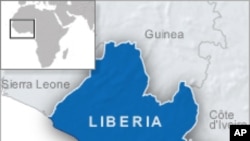As Archie Ponpon fights for gay rights in Liberia, he sometimes faces violent hurdles.
First his mother’s house was burned to the ground. Then, after speaking out for gay rights on public radio last week in the capital, Monrovia, a violent mob confronted him as he left the station and police had to intervene to save the activist from potential harm.
Ponpon is head of the Movement for the Defense of Gays and Lesbians in Liberia. He and his group have sparked public debate across the country as they visit universities to garner support from students for their movement to allow domestic partnerships for gays.
Though Ponpon said most lawmakers strongly oppose the idea of gay marriage, his group is approaching those in the government who might be sympathetic to their cause.
“We are going to find the very friendly ones to see as to whether we can make a fair proposition to them. So, this is where we are right now with the issues of who we engage. I already have the draft built of the amendment of the civil domestic partnership that includes transgender persons, gays, lesbians, in terms of civil law marriage, what would be discussed as a civil partnership.”
He said he and his group see 2012 as a year to make progress for gay rights in Liberia, but they know it will be hard.
“Many attacks keep coming our way. We’re living to see the next year as a combat. We’re not going to back up, and I’m not afraid of death.”
Ponpon added the Liberian government has prevented his group from formally registering their organization within the government system, but he has written to President Ellen Johnson Sirleaf in the hope she will help his group.
Sirleaf has not yet responded to his letter and, despite public pressure, she has yet to formally announce her position on the issue of gay rights and gay marriage in Liberia.
The president’s office said Sirleaf will soon declare whether she supports a new bill proposed by ex-first lady-turned-Senator Jewel Taylor. The bill would make homosexuality a first-degree felony and a crime punishable by up to ten years in prison.
Parliament member Edward Karfiah is one lawmaker who supports Taylor’s proposed amendment and said he remains firmly against legalizing civil unions for gay couples.
“For me, to think that you would you would say you are going to marry a man, if you go back to the Bible, you are going to understand it was because of homosexuals’ behavior that the cities of Sodom and Gomorra were destroyed by God. If we are Christian indeed, then we should not be condoning such practices. If it would require my vote, then, of course, as the speaker said, I will throw it in the ocean.”
Public reaction id mixed. Liberian Mary Flomo said she would interrupt any gay marriage ceremony she encountered.
“I accuse it totally. I accuse it because that does not belong in the country… I will stone them.”
But, Leroy Wilson said attitudes like that prevent the gay population from getting much-needed healthcare. He added cultural excuses are not a good enough reason to restrict gays from marrying.
“Most people talk about [it as] against our African culture. There are a lot of things that a lot of people do, a lot of society members do, that are against our African culture. You don’t see that. You don’t see fornication. You don’t see adultery. You don’t see a lot of things. Those are all against our African culture. If it gets to be legalized, fine. That’s a plus.”
Current laws in Liberia forbid gay marriage and voluntary sodomy is punishable by up to a year in prison.




